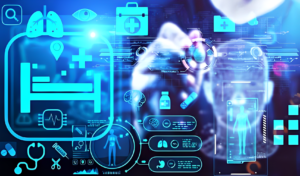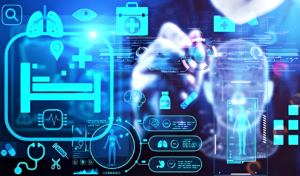I. Introduction
The application of artificial intelligence (AI) in healthcare is a rapidly evolving discipline that uses cutting-edge technology to enhance patient care, diagnosis, and treatment delivery. It includes a broad range of tools and applications intended to improve healthcare’s effectiveness, precision, and general standard of care. Artificial Intelligence (AI) has the potential to transform the healthcare business in many ways, including early illness identification, customized treatment plans, administrative work efficiency, and better results for patients. AI is at the center of innovation in this field. Large-scale medical data is processed and analyzed using machine learning, natural language processing, computer vision, and data analytics. This gives healthcare workers important insights and resources to help them make better decisions. AI integration in healthcare promises a more proactive, patient-centered, and economical healthcare system.

The significance and potential of AI in transforming the healthcare industry.
Enhance Diagnostics: AI has a remarkable ability to accurately evaluate medical data, which helps with early illness identification and accurate diagnostics.
Improve Therapy: AI can improve medication discovery and customize treatment plans, resulting in more focused and efficient therapy.
Improve Patient Care: AI makes telemedicine, remote monitoring, and predictive analytics possible, which leads to better patient outcomes and easier access to care.
Increase Efficiency: By automating administrative work, artificial intelligence (AI) lowers operating expenses and frees up healthcare personnel to concentrate on patient care.
Handle Big Data: Artificial intelligence (AI) analyzes and deciphers enormous volumes of medical data, revealing insightful information that can guide medical judgment.

Artificial intelligence (AI) has enormous potential in the healthcare industry. It holds the key to a more effective, patient-focused, and economical healthcare system, which will ultimately lead to better overall health outcomes and treatment quality.
This blog post will cover.
- Introduction
- The Current State of Healthcare
- The Rise of AI in Healthcare
- AI-Powered Diagnostics
- AI-Enhanced Treatment
- Challenges and Ethical Considerations
- The Future of AI-Powered Healthcare
II. The Current State of Healthcare:
Challenges and limitations in the current healthcare system.
The existing healthcare system has a number of issues and restrictions, including:
Access to Care: Inequality in access to high-quality healthcare services due to factors such as income, geography, and insurance coverage.
Rising Healthcare prices: A steady growth in healthcare prices that makes it unaffordable for many people.
Administrative Burden: Administrative tasks that take up time and divert resources away from patient care.
Fragmented Care: Poor coordination and a lack of continuity in patient care.
Negative results: Human errors in diagnosis, treatment, and drug management that result in negative results are referred to as medical errors.
Data Management: Difficulties in maintaining and sharing healthcare data among providers and systems.
Healthcare Professional dearth: A dearth of healthcare professionals leads to delayed services and overcrowded facilities.
Aging Population: As the population ages, there is a greater demand for healthcare services and long-term care.
Preventive Care: focusing on treatment rather than prevention, resulting in missed opportunities to reduce chronic diseases.
Healthcare Disparities: huge differences in healthcare outcomes based on race, ethnicity, and socioeconomic status.
Regulatory Complexity: Healthcare regulations that are complex and can hinder innovation and service delivery.
Patient data safety: Concerns about safeguarding patient data and maintaining privacy in the digital healthcare landscape.

It is important to address these issues in order to improve the overall quality, accessibility, and cost-effectiveness of healthcare services. Innovative solutions, such as the integration of AI and other technologies, can help to address these issues.
The need for innovation and improvement in healthcare
The desire to improve patient outcomes, increase access to care, lower costs, and address the evolving healthcare landscape, including an aging population and the rise of chronic diseases, inspires the need for healthcare innovation and improvement. While adapting to new challenges and opportunities in the field, innovation is vital for providing more effective, productive, and accessible healthcare services.
III. The Rise of AI in Healthcare
Integration of AI technologies into healthcare.
AI technologies are being integrated into healthcare through a variety of applications, including:
Medical Imaging: AI helps in the interpretation of medical images, improving diagnostic accuracy in fields such as radiology and pathology.
Diagnostics: AI algorithms analyze patient data to aid in disease detection and risk assessment, resulting in timely and precise diagnoses.
Treatment Planning: AI assists in personalizing treatment plans by taking into account individual patient data and optimizing therapies for better outcomes.
Drug Discovery: AI helps in drug development by predicting molecular interactions and identifying potential drug candidates.
Remote Monitoring: AI enables continuous patient monitoring, enabling early intervention and personalized care.
Telemedicine: Artificial intelligence-powered telemedicine platforms improve access to healthcare services by enabling remote consultations and diagnostics.
Administrative Tasks: Administrative tasks are automated by AI, reducing paperwork and streamlining healthcare operations.
Predictive analytics: AI makes better use of healthcare resources by forecasting disease outbreaks, patient readmissions, and resource requirements.
AI is a useful tool in the healthcare sector because of these applications, which raise the standard, effectiveness, and accessibility of healthcare.
AI applications in healthcare
Here are some examples of AI in healthcare applications in diagnostics, treatment, and patient care:
Diagnostics:
Medical Imaging: AI algorithms can detect abnormalities in X-rays, MRIs, and CT scans and assist radiologists in diagnosing conditions such as cancer, fractures, and neurological disorders.
Pathology: Artificial intelligence can help pathologists identify tissue samples and classify cancerous cells more accurately.
Early detection: AI systems can analyze patient data to detect early signs of diseases such as diabetes and heart disease, allowing for timely intervention.
Treatment:
Personalized Treatment Plans: AI customizes treatment plans, such as cancer therapies and medication dosages, to maximize effectiveness.
Drug Discovery: AI accelerates drug discovery by predicting molecular interactions, which shortens the drug development process.
Surgical Robotics: Artificial intelligence-powered surgical robots help surgeons perform complex procedures with precision and minimal invasiveness.
Patient Care:
Predictive Analytics: AI predicts disease outbreaks, patient readmissions, and high-risk cases, allowing for proactive care and resource allocation.
Remote Monitoring: AI-powered wearable devices and telemedicine allow for continuous patient monitoring and remote consultations.
Chatbots and Virtual Assistants: AI-powered chatbots and virtual assistants provide patients with healthcare information, reminders, and support.

These examples show how AI can be used to improve diagnostics and treatment, as well as improve patient care and overall health outcomes.
AI in terms of accuracy, efficiency, and cost-effectiveness.
In terms of accuracy, efficiency, and cost-effectiveness, AI in healthcare offers several advantages:
Accuracy:
AI algorithms can analyze medical images and patient data with high precision, reducing the risk of misdiagnosis.
AI can identify early disease markers and predict patient outcomes, allowing for more timely interventions.
AI personalizes treatment plans based on individual patient data, increasing treatment effectiveness.
Efficiency:
AI quickly processes large amounts of medical data, allowing healthcare professionals to make more informed decisions.
Artificial intelligence (AI) automates administrative tasks, reducing paperwork and streamlining operations.
AI aids in the optimization of hospital and clinic workflows, thereby improving resource allocation and patient care.
Cost-Effectiveness:
AI’s predictive capabilities can lead to early interventions and prevention, potentially lowering chronic disease long-term costs.
By automating administrative tasks, AI can help healthcare facilities reduce their operational costs.
AI assists in the efficient allocation of resources, reducing waste and cost overruns.
Overall, the use of AI in healthcare can result in better patient outcomes, streamlined processes, and lower healthcare costs, making it a valuable asset in the industry.
IV. AI-Powered Diagnostics
How AI is transforming medical diagnosis
By analyzing medical images and patient data with high accuracy, AI is transforming medical diagnosis, assisting healthcare professionals in the early and precise detection of diseases such as cancer and neurological disorders. This increases diagnostic speed and accuracy, resulting in more effective treatment and improved patient outcomes.
Use of AI in early disease detection and medical imaging
Improve Accuracy: AI algorithms can analyze medical images like X-rays and MRIs with high accuracy, assisting in the detection of abnormalities, lesions, or early signs of disease.
Early Diagnosis: AI can detect subtle patterns or changes that may be indicative of disease, allowing for early diagnosis and intervention.
Faster Results: AI reduces the time required for image analysis, providing healthcare providers and patients with faster results.
Reducing False Negatives: Artificial intelligence (AI) can help reduce the rate of false negatives in medical imaging, ensuring that fewer cases go undetected.
Enhanced Screening: AI can be used for large-scale screening programs, making it easier to screen populations for diseases such as breast cancer or diabetic retinopathy.
It means, that using AI in early disease detection and medical imaging contributes in more precise, timely, and accurate diagnoses. Which results in better patient outcomes and a better healthcare system.
Success stories of AI-powered Diagnostics
There have been several success stories of AI-powered diagnostics in healthcare. Here are a few examples:
IBM Watson for Oncology: IBM Watson for Oncology is an artificial intelligence (AI) system designed to help oncologists make treatment decisions. To provide personalized treatment recommendations, it analyzes medical literature, clinical trial data, and patient records. This system has been used in a variety of healthcare settings, including hospitals in India and Thailand, where it has assisted oncologists in making better treatment decisions.
PathAI for Pathology: PathAI is an AI platform that aids pathologists in disease diagnosis using histopathology slides. It can detect patterns and anomalies in tissue samples, which can help with cancer diagnosis and treatment planning. PathAI has been used to improve pathology diagnosis accuracy and efficiency.
Diabetic Retinopathy: IDx-DR: IDx-DR is an autonomous AI system that analyzes retinal images to detect diabetic retinopathy. It was approved by the FDA as the first AI-based diagnostic system for medical use. The technology is used in primary care settings, allowing for the early detection of diabetic eye diseases.
These case studies show how AI can be successfully integrated into diagnostic processes to improve accuracy and efficiency while reducing the workload on healthcare professionals. AI has the potential to transform disease diagnosis in a variety of medical fields
V. AI-Enhanced Treatment
AI in treatment planning and personalized medicine.
By analyzing individual patient data, including genetic, medical, and lifestyle information, AI aids in treatment planning and personalized medicine.
Treatment Tailoring: AI algorithms consider a patient’s unique characteristics to recommend personalized treatment plans, maximizing therapy effectiveness.
Predicts Outcomes: AI can predict how patients will react to specific treatments, allowing healthcare providers to make more informed decisions.
Drug Discovery: AI speeds up drug development by identifying potential drug candidates that match a patient’s genetic and disease profile.
Treatment Optimization: Artificial intelligence continuously refines treatment strategies based on real-time patient data, ensuring the most effective care.
In essence, artificial intelligence enables healthcare professionals to provide more precise and targeted treatments, improving patient outcomes in personalized medicine.
Examples of AI-driven treatments and therapies.
Here are a few examples of AI-powered treatments and therapies:
Immunotherapy in Cancer Treatment: AI is used to analyze a patient’s genetic and molecular data in order to identify suitable immunotherapy candidates. This personalized approach improves the efficacy of cancer treatments by increasing the patient’s immune response to cancer cells.
Precision Medicine for Cardiovascular Diseases: AI algorithms analyze patient data such as genetic information, lifestyle factors, and medical history to develop personalized treatment plans for cardiovascular diseases. This method optimizes medication dosages as well as lifestyle recommendations.
Robotic-Assisted Surgery: Artificial intelligence-powered surgical robots assist surgeons in performing minimally invasive procedures with high precision. This technology is used in a variety of surgical fields, such as gynecology, urology, and orthopedics.
Remote Monitoring and Telemedicine: AI-powered monitoring systems allow for continuous remote monitoring of patients with chronic conditions such as diabetes or heart disease. Based on the data collected, healthcare providers can adjust treatment plans in real-time, improving patient care.
Mental Health Apps: AI-powered mental health apps offer therapy and support to people suffering from mental illnesses. Based on user interactions and needs, these apps provide personalized interventions and cognitive-behavioral therapy.
These examples demonstrate how AI can be used to develop novel treatments and therapies in a variety of medical specialties, ultimately leading to better patient outcomes and care.
VI. Challenges and Ethical Considerations
Challenges and potential risks associated with AI in healthcare.
The following are some of the challenges and potential concerns related with AI in healthcare:
Privacy: Concerns related to the security and privacy of patient data, particularly when it is shared and kept digitally.
Ethical Considerations: The necessity to handle ethical issues such as AI algorithm bias, decision transparency, and data consent.
Regulatory Obstacles: Ensuring that AI applications fulfill legal and safety standards, as well as comply with healthcare regulations.
Interoperability: It is the capacity of different AI systems and electronic health records to communicate successfully in order to provide a comprehensive view of patient data.
Human Oversight: The significance of keeping humans involved in key healthcare decisions made by AI systems.
Accountability: Determining accountability in the event of errors or negative effects with AI-powered healthcare solutions.
Adoption and training: The necessity for healthcare personnel to adapt to and trust AI technologies, as well as the availability of adequate training.
Resource Allocation: Allocating resources in such a way that AI benefits are spread evenly and do not increase healthcare disparities.
Cost of Implementation: The monetary outlay required to implement and maintain AI technologies in healthcare facilities.

Addressing these issues and potential threats is critical to realizing AI’s full promise in healthcare while guaranteeing patient safety, data security, and ethical technology use.
VII. The Future of AI-Powered Healthcare
Potential advancements and trends
Among the anticipated improvements and trends in the field of healthcare utilizing AI are:
AI-Driven Drug Discovery: AI algorithms will hasten drug discovery, resulting in more tailored and effective drugs, especially for rare disorders.
Genomic Medicine: AI will play a crucial role in analyzing genetic data, resulting in more tailored treatment regimens based on an individual’s genetic profile.
AI-Enhanced Imaging: Advances in AI algorithms for medical imaging, such as radiology and pathology, will improve diagnostic accuracy.
Healthcare Chatbots: AI-powered chatbots and virtual assistants will advance, giving real-time health advice and support.
Population Health Management: AI will be utilized to assess population health data, allowing for early treatment and public health policies.
AI in Drug Repurposing: AI will find current pharmaceuticals that can be repurposed for new medical applications, potentially accelerating therapy development.
Continuous Monitoring: AI-powered wearable devices will monitor health metrics continuously, alerting patients and healthcare practitioners to changes or potential issues.
Artificial Intelligence for Mental Health: AI-powered mental health apps will provide individualized assistance, therapy, and early identification of mental health disorders.
AI in Clinical Trials: AI will make clinical trials more efficient by streamlining recruiting, data analysis, and patient stratification.
AI in Healthcare Administration: Artificial intelligence (AI) will further automate administrative jobs, lowering paperwork and streamlining healthcare operations.

These developments and trends reflect an increasing integration of AI technology into numerous parts of healthcare, with the potential to dramatically improve patient care, research, and the broader healthcare system.
How AI can contribute to a healthier and more efficient healthcare system.
AI can help to make the healthcare system better and more efficient by improving diagnostic accuracy, personalizing treatment plans, streamlining administrative tasks, enabling remote monitoring and telemedicine, and optimizing resource allocation. These applications improve patient outcomes, reduce costs, and increase access to healthcare services, making the healthcare system more effective and responsive to patient needs.




